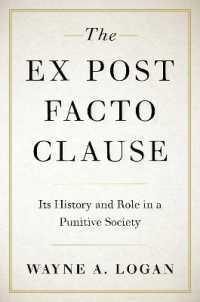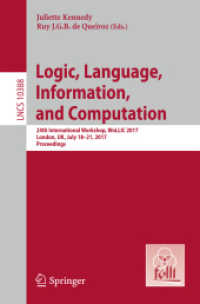Full Description
Society, Regulation and Governance critically appraises the issue of intentional social change through the lens of regulation and governance studies. A twofold understanding of regulation and governance underpins the conceptual and empirical engagement throughout the book. On the one hand, regulation and governance are understood to be innovatively minded. On the other hand the book argues that, at their respective cores, regulation and governance are continuously concerned with how intentional social change can be fostered and what results can be yielded in terms of shaping society. This book brings together sociologists, political scientists, legal scholars and historians to produce an interdisciplinary critical evaluation of alleged 'new modes' of social change, specifically: risk, publics and participation. It makes three key contributions by:
offering a consolidation and re-appraisal of a debate that has become increasingly vague with its academic and political proliferation
identifying a uniting conceptual-analytical core between regulation and governance which explains the adaptability and innovation-mindedness of processes of 'shaping society'
re-focusing on the 'essence' of regulation and governance approaches - intentional modes of social change.
Society, Regulation and Governance will give significant insight into the potential and limits of new methods of social change, suiting a wide range of social science and legal academics due to its collaborative nature.
Contributors include: A.-L. Beaussier, A. Bora, E. Carmel, M. Huber, D. Kuchenbuch, M. Mölders, P. Münte, R. Paul, H. Rothstein, J.-F. Schrape, L. Viellechner
Contents
Contents:
Introduction. Society, regulation and governance: new modes of shaping social change?
Regine Paul and Marc Mölders
Part I Society, Regulation and Governance: A Conceptual-Analytical Map
1. Semantics of ruling: reflective theories in regulation, governance and law
Alfons Bora
2. 'Bringing the social back in': governance analysis as a mode of enquiry
Emma Carmel
Part II: New Modes of Social Change? 'Risk' and 'Publics' in Regulation and Governance
3. Risk: new issue or new tool in regulation and governance research?
Regine Paul
4. Why states think about risk differently: the case of workplace safety regulation in France and the UK
Henry Rothstein and Anne-Laure Beaussier
5. Regulating teaching quality: comparing quality regulation in English and German higher education
Michael Huber
6. Governing through transnational arrangements: the case of internet domain allocation
Lars Viellechner
7. Shaping pressure: on the regulatory effects of publicity
Marc Mölders
8. Reciprocal irritations: social media, mass media and the public sphere
Jan-Felix Schrape
Part III: What's New about New Modes of Social Change in Regulation and Governance? The Case of 'Participation'
9. The experimentalization of the social: activation, participation and social self-organization as scientific facts in the 1940s
David Kuchenbuch
10. Improving modern society: governing science and technology by engineered participation
Peter Münte
References
Index








